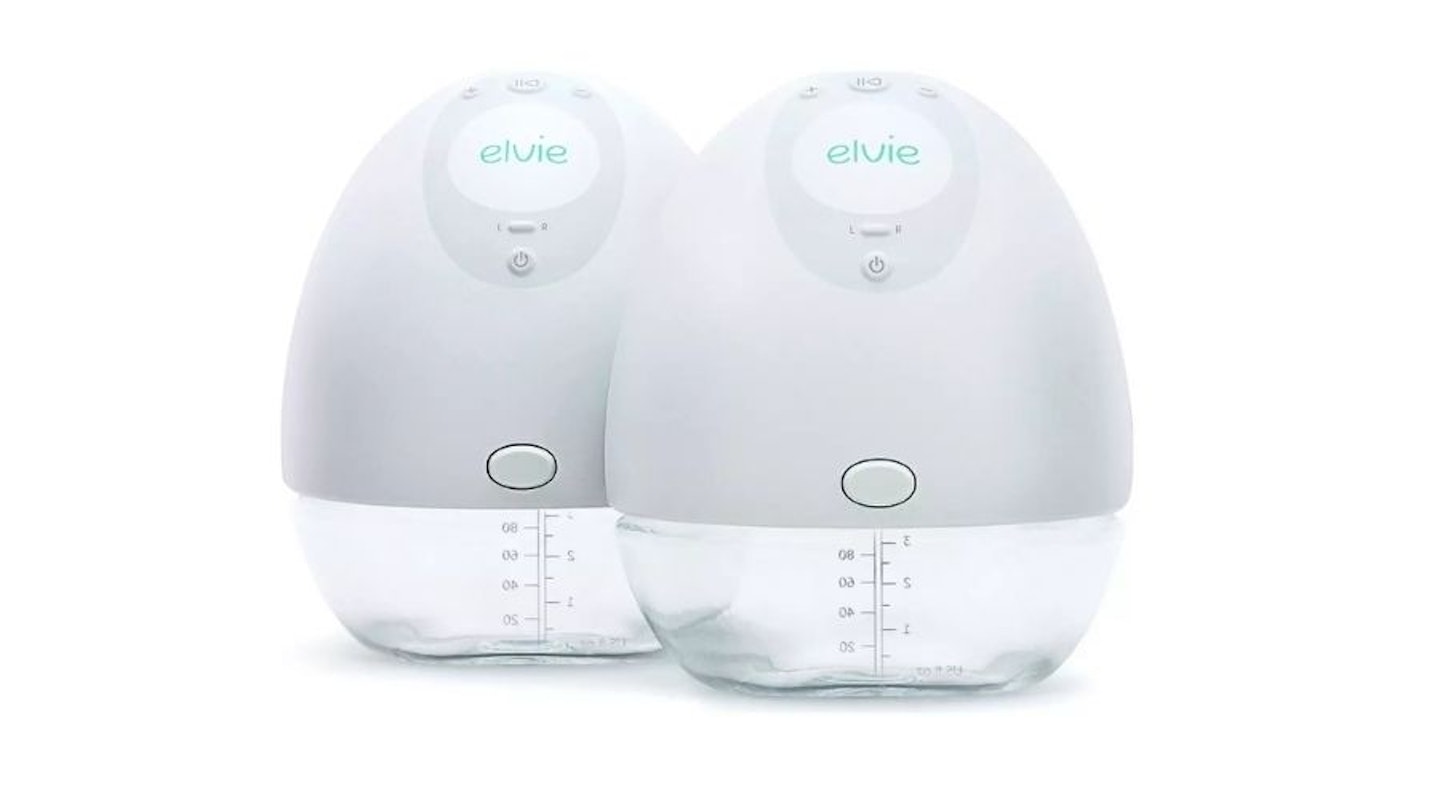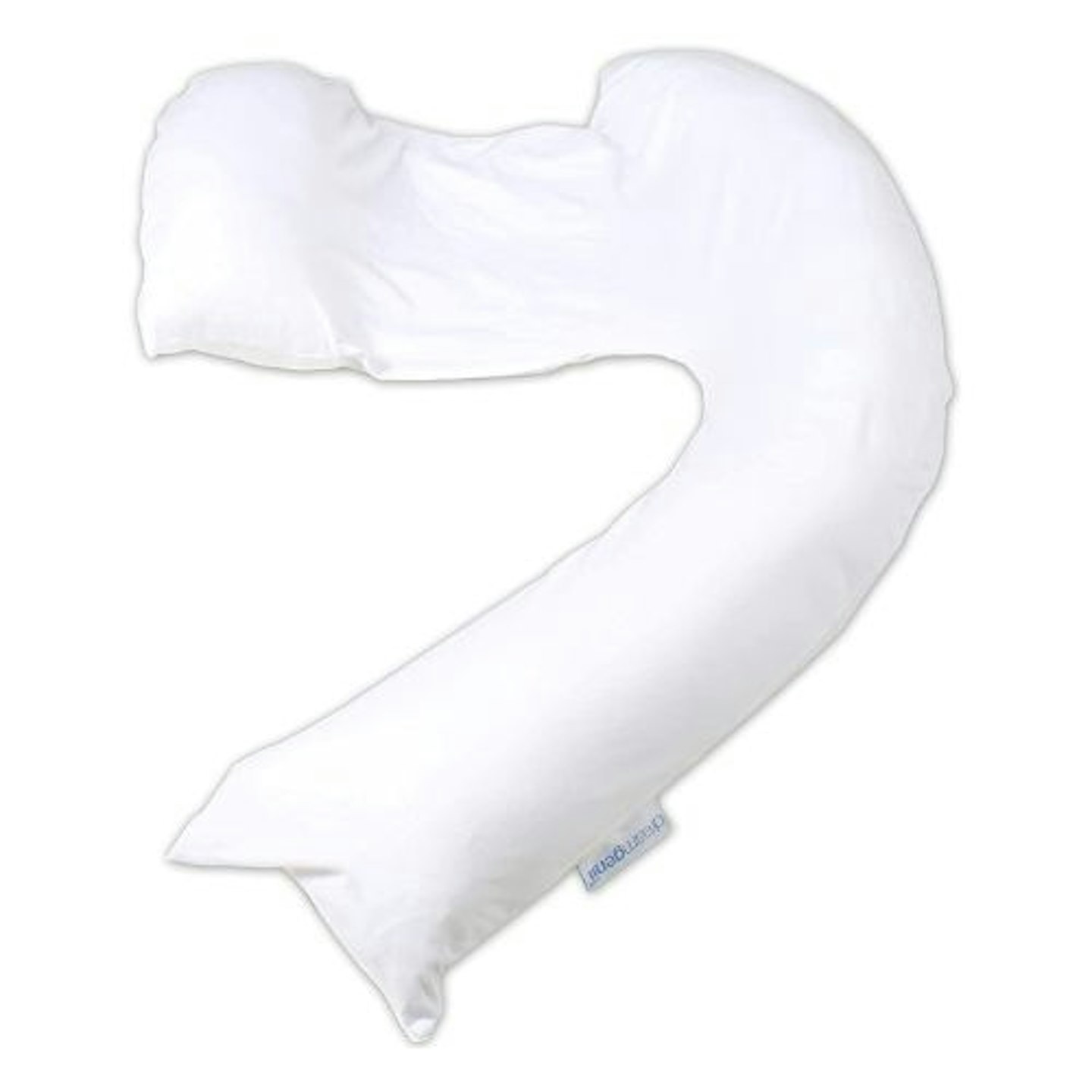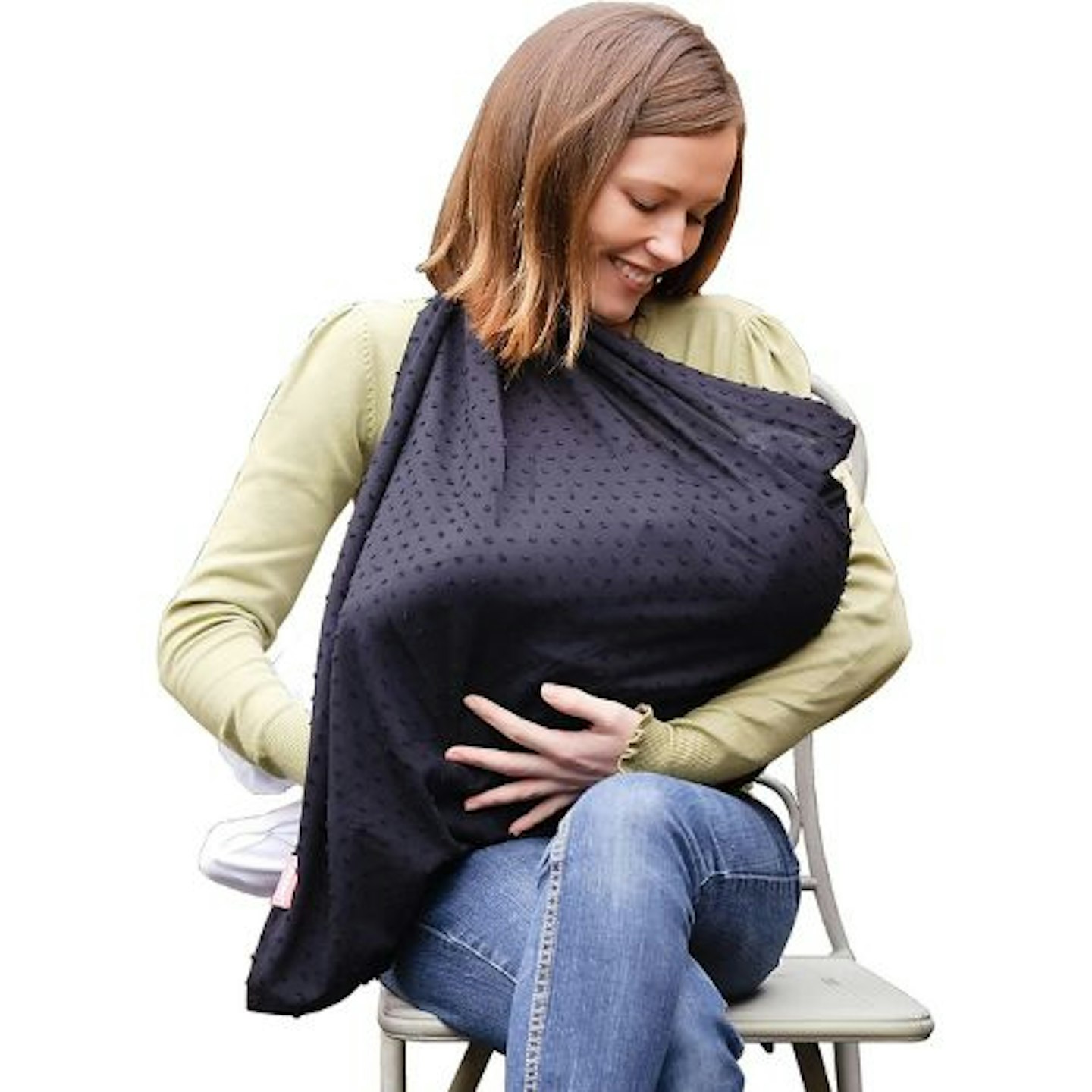Your baby probably slept more than they did eat in the first few weeks as a newborn, but as bubba grows bigger they'll need more nutrients and calories, meaning little one may start to feed a lot more than normal. Cluster feeding can be a pretty exhausting time, as you might feel like you're doing nothing but feeding. But don't worry, here's everything you need to know about cluster feeding and how to manage it with expert advice from Midwife Pip and Lactation Consultant, Sioned Hilton.
What is cluster feeding?
"Cluster feeding is a normal, physiological part of breastfeeding." Says Pip. "It is when your baby wants to feed very frequently, around every 20 – 60 minutes, and it can go on for many hours at a time." She continues. As your baby grows, they'll need more nutrients, so cluster feeding is your child's way of getting those nutrients and calories as their appetite increases.
It's important to remember that when your baby starts to cluster feed, that there is nothing wrong with your milk supply and it isn't that your baby isn't getting enough milk on their first feed, so you don't need to think about supplementing with formula. Their instincts know that the more often baby feeds, the more milk will be produced.
If you find you're struggling with feeding, remember to consult your GP or Health Visitor.
Some parents often confuse cluster feeding with colic. The major difference between cluster feeding and colic is that colic isn't usually soothed by feeding.
Cluster feeding and milk supply
Your milk supply is cleverly tailored to how much your baby's demands. "Breastmilk production works on supply and demand so the more your baby feeds, the more demand is created and therefore the more milk supply you have." Says Midwife Pip.
Naturally, your baby was sleeping more as a newborn, meaning you may have gotten into a feeding pattern. But it's normal for their intake of breast milk or formula to double during the first six months of life and by cluster feeding, your smart tot can ensure there's plenty more where that came from.
Why do babies cluster feed?
According to Midwife Pip, babies may cluster feed for different reasons. "In the earliest days when colostrum is being produced, babies often cluster feed to encourage mum’s milk to come in. Babies may then cluster feed at other times to boost milk supply to coincide with growth spurts whereby they need more nutrients.
"In warm weather babies may cluster feed for hydration as a large component of breastmilk is water. Breastfeeding is not just for hunger or thirst so babies may cluster feed for comfort if they are unwell, teething or uncomfortable for example or to help them to sleep and breastmilk contains hormones that promote sleep in babies." Says Midwife Pip.
Sioned Hilton, registered International Certified Lactation Consultant, says cluster feeding is also a way for mum to bond with her baby.
"It is often thought of as nature’s way of encouraging baby to have close baby to mum cuddles, stimulate tomorrow’s breast milk supply, that in turn boosts feeding hormones.
"Cluster feeding can also coincide with baby growth spurts(typically around 3 weeks and 3 months). Even if you have established a routine based on your baby’s demands, you may still find that they have periods of cluster feeding, particularly if they are unwell or needs reassurance."
When do babies cluster feed?
While every baby is different, most babies experience two periods of cluster feeding, the first at three weeks and another at six weeks as this is when your baby will experience their growth spurts. You'll know a cluster feed is looming as you get to know your baby's hunger cues and you'll probably notice them doing the below:
• You'll start to recognise your baby's cry for when they're hungry, and baby might cry more frequently when they're cluster feeding.
• When your baby starts to sleep more during the night, be prepared for more feeding during the day, too. Your baby will feed more to make up for missed feeds during the night.
• They won't stop crying until they're fed.
• They want to eat constantly.
• They seem content when eating.
• Regularly have wet and dirtied nappies.
Midwife Pip says, "Babies can cluster feed at anytime of day, night or at any age but common growth spurt times are around 3 weeks , 6 weeks and 12 weeks and so often periods of cluster feeding fall around these times so baby can increase milk supply to meet their increased needs."
How long does cluster feeding last?
It may be completely natural but that doesn't mean cluster feeding isn't completely knackering and you're more than entitled to wonder when it'll end. The good news is that bouts of cluster feeding don't tend to go on for longer than two days so the end is in sight.
According to Midwife Pip, "Cluster feeding sessions may go on for several hours at a time but rarely last more than 2 days or nights so although they can feel really draining both physically and emotionally at the time they will pass and are relatively short lasting."
How to manage cluster feeding
"Cluster feeding can feel tough and be draining so make sure you are well hydrated, nourished and in a comfortable and supported position." Advises Midwife Pip. "Having some entertainment to hand, someone to keep you company and reminding yourself that it is a normal phase and not a sign of a problem can help you to get through patches of cluster feeding," she continues.
Cluster feeding is completely normal and it's important to remember to just relax and follow your baby's lead. Ways you can help deal with cluster feeding are:
• If you're breastfeeding, try expressing in between feeds to keep up your milk supply.
• Drink plenty of water and eat well.
• Let your family and partner support you when they can.
• Keep yourself entertained during feeds with your favourite boxsets or parenting podcasts.
• Try and change positions when you can to avoid getting sore and uncomfortable.
• Make use of your sling or baby carrier. Pop your baby in a sling and cluster feed on the go if you feel up to it.
Many mums are often also concerned that cluster feeding means their milk supply is low, but this is usually not the case. Your doctor or midwife will easily be able to tell if your baby isn't getting enough milk from their weight, so if you do have concerns about milk supply, speak to your midwife.
The best breastfeeding products
This pump is a real stand out product in the market thanks to its groundbreaking hands-free solution for mums. Designed to fit discreetly inside a nursing bra, this wireless pump offers silent pumping with the assistance of app control for convenience and flexibility. Our mum tester and Mother&Baby Editor Maria Martin loved how easy it was to use and how seamlessly she could use it on a daily basis.
The ability to control the pump remotely via the app made the whole expressing experience much easier for parents, providing them with valuable tracking features for milk volume and pumping history. Maria was a big fan of the app, commenting; “The Elvie Pump app lets you adjust the suction sections from your smartphone, which is very helpful and saves you jumping down your bra to adjust settings from the hub. This means you can feel that little bit more confident, say when family and friends are around. You can also use the app to track how many times you’ve pumped previously and to monitor milk volume. This can really help you to also figure out the best times to pump for yourself.”
Made up of just five parts, cleaning and reassembling the pump is quick and straightforward. Its silent operation allows for discreet pumping, whether you’re in public or with a sleeping baby nearby, making it ideal for breastfeeding on one boob and pumping on the other as mum Maria found. “The pump is silent so the early morning pumps were a dream – I could sit silently feeding on one breast and pump with the other. Or just pump without waking anyone up from a loud pump sound.” Maria said.
Although the Elvie Pump comes with a higher price tag, many mums believe it really is good value for money thanks to how comfortable and convenient it is as well as the quiet sound and clever app operation. Our testers however did find some minor drawbacks such as leakage during certain activities and the inability to charge while in use. Mum tester Maria said, “One thing that wasn’t ideal was that you can’t charge the hub and pump at the same time! This caused slight frustration when I needed to pump but the Elvie wasn’t charged. Although I didn’t have to wait long, maybe 10 minutes to get a bit of charge to sort out that engorged breast.”
Read our full Elvie Breast Pump review
Pros
- Makes no noise
- App controlled
- Wireless
- Small, lightweight and fits comfortably inside bra
- Tube-free so can crack on with the rest of your day
Cons
- Cannot be used while charging
- Short battery life
| Type: | Hands free Electric Breast Pump |
| Specifications: | 10 x 5 x 1 cm |
| Weight: | 30g |
| Milk Capacity: | 150ml |
| Battery: | 2.5 hours |
Best stylish pregnancy pillow
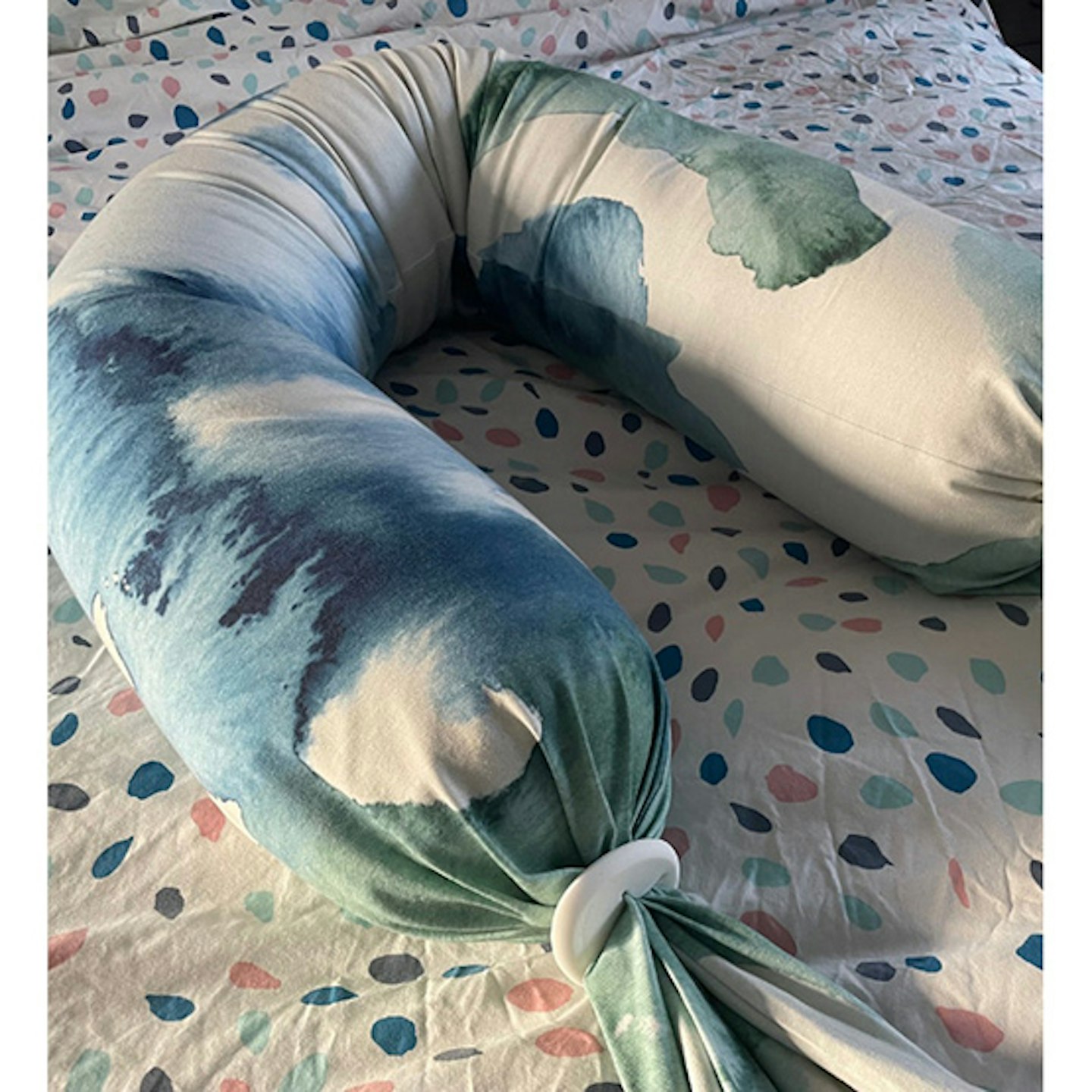 MOTHER&BABY
MOTHER&BABYThis bbhugme Pregnancy Pillow is one of the more expensive options on our list, but we believe it's worth the extra cash. Designed by health professionals, it is fully adjustable and provides five-point support throughout pregnancy and beyond to the most critical areas - the pelvis, lower back, knees, ankles, and abdomen.
Our Features and Reviews editor, Emily, described this pillow as feeling like "you're sleeping on a cloud" as it moulds around the body for support where you need it most, making it easier to relax and get comfortable during pregnancy. She added, "The difference I have noticed since using the bbhugme pillow at night - especially as my pregnancy progresses - has been huge for me. It's so comfortable to snuggle into, and my body feels so much less achy when I wake up, thanks to all the support I'm receiving."
We love that it enables sleep and rest from the first trimester and can support you throughout your breastfeeding journey too. Our favourite features are the removable cover and handy travel-sized bag, but it does take up quite a bit of room in the bed.
Read our full bbhugme Pregnancy Pillow review
Pros
- Adjusts to your shape
- Machine-washable cover
- Supports multiple areas of the body
- Recommended by midwives
- Comes with travel bag
Cons
- Quite large
- The 'pebbles' can be uncomfortable
| Dimensions: | 150 cm x 20 cm |
| Outer material: | 95% cotton, 5% spandex jersey fabric Standard 100 by Oeko-Tex Class 1 Certified |
| Inner material: | Filled with BioFoam, which is CO2-neutral, non-hazardous, hygienic, lightweight and durable |
| Weight: | 1.9kg |
| Care: | Cover is machine washable at 40 max, do not tumble dry |
 MOTHER&BABY
MOTHER&BABY
For those with the cash, it’s a great investment in your baby’s feeding, but also yourself, affording you a more comfortable and quick breast pumping experience. It's not the only double electric breast pump available, and definitely not the cheapest, but it does offer the whole package, (although the bandeau bra to hold the bottles in place is sold separately) and offers more than your average pump. Spending hundreds is by no means vital to your ability to pump efficiently, but if you can swing it the Medela Flex is one of the best, and somehow makes pumping feel (a little) more stylish. Which can only be a bonus.
Pros
- Lightweight
- Easy to use
- Easy to clean
Cons
- A little loud
Best easy-to-use breast pump
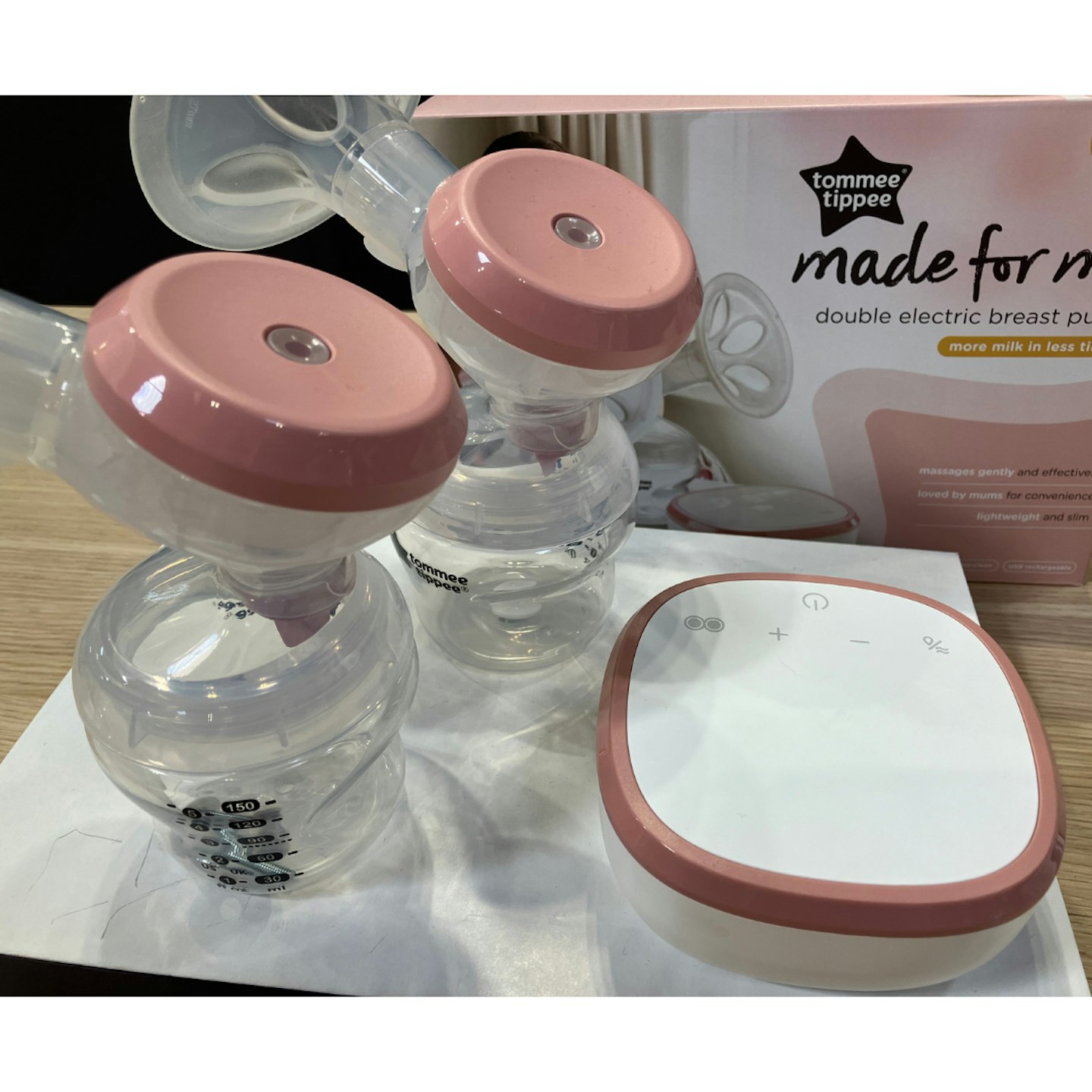 MOTHER&BABY
MOTHER&BABY
This pump was shortlisted for a Mother&Baby Award in 2021.
For busy mums who just want a breast pump that’s straightforward to use from day one, then the Tommee Tippee Made for Me Double Electric Breast Pump is one you might want to consider. Lightweight with remarkably quiet operation, this pump offers both comfort and convenience for pumping mums. Our mum tester Leah agrees, commenting; It’s easy to use and not complicated which is great for me because I don’t do well with things that take too much time to figure out when running around with 2 young children.” As well as how easy it was to use, parents loved the various settings, and the ability to express from one or both sides with just the push of a button with mum Kirstie saying, “being able to express both sides at the same time is a game-changer, and for the cost of this pump compared to a single pump, it’s definitely worth it!”
Powered by a lightweight, USB rechargeable power unit rather than needing to be connected to the mains, the pump provides 90 minutes of hands-free and cord-free pumping on the go which mum Nadine found great for work. “This pump charges via USB so although not “wireless”, you don’t need to be plugged in near a socket. You can basically pump anywhere, as it suggests. This is ideal if you’re pumping at work, or out of the house.” This pump also has a real powerful suction level, which helps maintain milk supply effectively, a feature which our mum tester Fahima loved. The powerful suction has really kept my milk supply going and for that. I have to say well done to Tommee Tippee. This product has allowed me to keep on breastfeeding my babies!” She said. This pump is also compatible with Tommee Tippee bottles as well as their other products.
Our mum testers also loved how quiet this pump was, making it suitable for use anywhere at anytime without disturbing others. Mum Helena agreed, saying; “This product is a lot quieter than others I have used, my partner commented he could still watch TV whilst I was pumping, more importantly for me, I wasn’t worried about it waking the baby!”
Operated using a handheld control panel with illuminated buttons to make things extra clear, the massage feature was a welcome feature, with Mum tester Kathryn saying, “it has various settings, and once you get to know what suits you, it's so easy to just press a couple of buttons, and off you go!” Some of our mum testers would have loved the addition of a carrying case as well as clearer instructions, but overall, mums were impressed with the pumps performance and value for money.
Read our full Tommee Tippee Made for Me Double Electric Breast Pump review
Pros
- Easy to use, quick to set up
- Powerful suction
- Comfortable design
- Quiet, so could be used anywhere
Cons
- It can be quite fiddly when trying to clean
| Type: | Double Electric Breast Pump |
| Dimensions: | 15.1 x 26 x 18.6 cm |
| Weight: | 522g |
| Milk Capacity: | 150 ml Each |
| Battery: | 90 minutes |
- Comfortable
- Easy to clean
- Easy to use
- Quiet
Best nursing pillow for extra back support
The unique design of the Dreamgenii Pregnancy Support and Feeding Pillow caters to various needs, encouraging left-side sleeping and providing targeted support for the bump, back, and legs. Despite its firmness, it effectively helps alleviate aches and pains during pregnancy and beyond, promoting better sleep quality. The washable cover is super convenient for any accidents, while its longevity, transitioning from pregnancy to nursing, makes it great value for money. While personal preference may vary regarding firmness, its mid-range price and space-saving design make it a great option for new and expectant mothers who are struggling with back pain.
Our mum tester and Mother&Baby writer Hannah Mellin reviewed this pillow and said: "From the first night, I noticed a difference in my comfort levels. Previously I'd been using a standard 'V' shaped pillow, which was OK for a while, but by 21 weeks, I was starting to need more support. I found that this does help you to stay asleep on your left side because it sort of hugs you.
"The back support is great and feels lovely in the small of your back; this is probably what keeps you on your left most of all. The 'sausage' like bit that goes between your legs is firm enough that it doesn't really squash down too much when you've got your legs around it, but it's thin enough so that you can move your legs if you need to so you don't get cramp. The part where your bump is meant to rest isn't really relevant to me at the moment as the bump isn't huge, but I think it will come in handy, and until then, I can just hug that part of the pillow!"
Read our full Dreamgenii Pregnancy and Feeding Support Pillow review
Pros
- Design for back pain
- Encourages left-side sleeping
- Range of designs
Cons
- Case is a bit fiddly to put on after washing
| Dimensions: | 35 x 15 x 42 cm |
| Weight: | 1.21 kg |
| Material: | 100 per cent Jersey Cotton |
Doubling up as as a trendy scarf, this breastfeeding cover is great for nursing and accessorising, so it's one less thing to pack in your changing bag! It has a hidden pocket inside to store your breast pad too, which is super handy.
Review: I bought the feeding scarf after watching the video tutorial. It really is easy to use whilst feeding out and about. The scarf made me feel confident to breastfeed in public. The material is good quality - baby doesn't get too hot underneath it - that was my concern with other breastfeeding scarves. I would highly recommend the mama designs scarves.
Pros
- You can maintain eye contact with your baby throughout the feed
Cons
- Some mums thought the material was too thin
Best compact breast pump
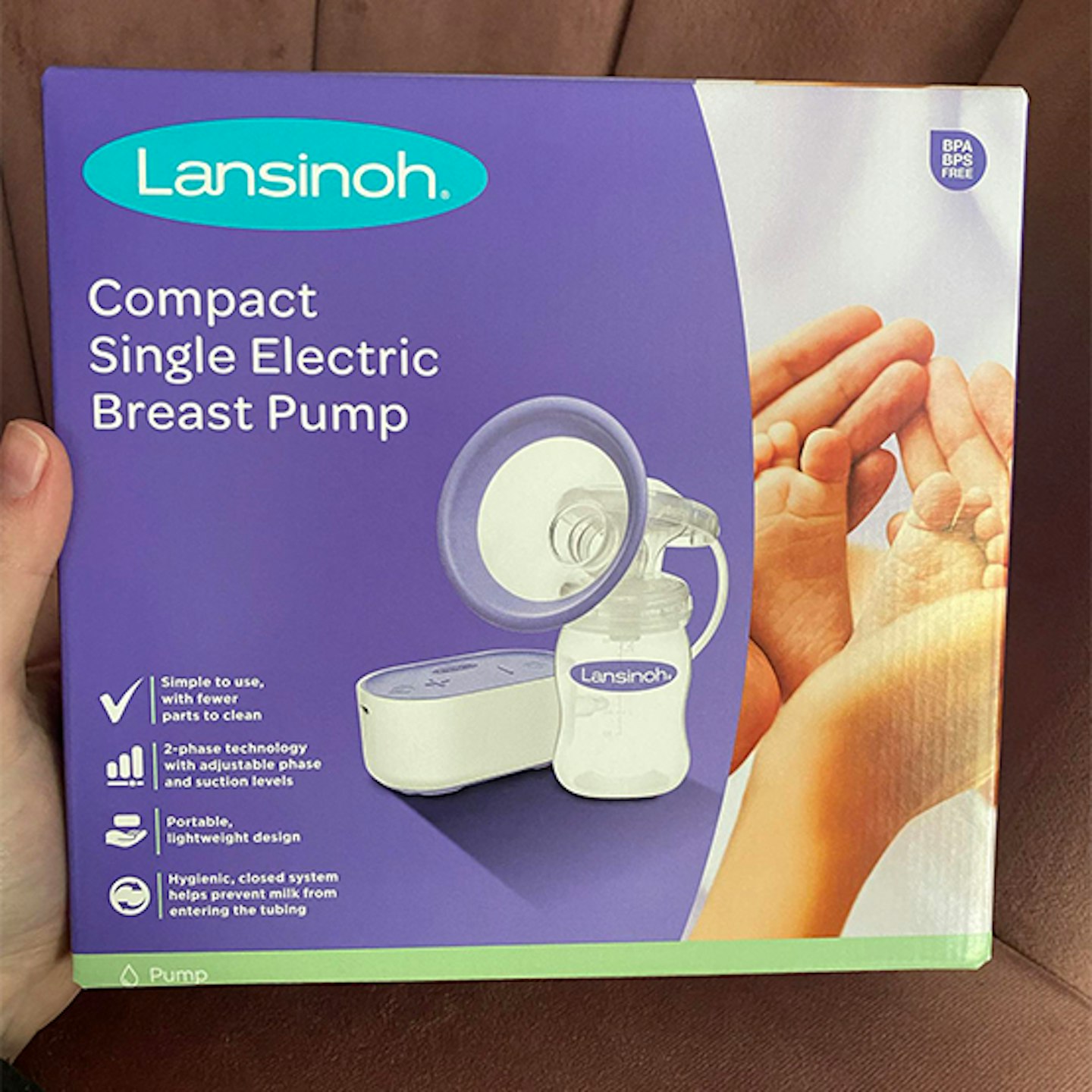 MOTHER&BABY
MOTHER&BABY
This pump was shortlisted for a Mother&Baby Award in 2018.
Long gone are the days of bulky and noisy breast pumps. If you’re on the hunt for something more lightweight and discreet, then we’d recommend the Lansinoh Compact Single Electric Breast Pump which is ideal for both home and on-the-go usage. Our mum testers loved how easy this pump was to use and particularly liked how compact the design was, especially when it came to storing it away. “I would recommend it to a mum because of the size as it is so easy to store,” commented mum Victoria. This pump also comes with a range of features to make pumping more convenient and comfortable such as the long power cord and rubber suction tube, which provide flexibility during pumping sessions.
Despite its compact size, it offers impressive pumping performance. Featuring six adjustable settings in each of the two phases, this pump can be personalised to your own needs and comfort levels to ensure efficient milk expression. Users also highlight the effectiveness of the pump in stimulating milk flow and the comfort it offers during use. Our mum tester Amber agreed on its efficiency, commenting; “This product makes my life easier as a mum as I can express a whole bottle of milk in five to ten minutes.” The inclusion of the clear digital display technology allows for easy monitoring and adjustment of suction levels. “The light display is very useful and enables you to immediately see what suction speed the pump is working at.” Said mum tester, Hannah.
The cleaning and sterilising process was also very straightforward and quick and mum testers liked that it was compatible with the Lansinoh bottles, allowing for seamless feeding and storage. Our mum tester Hannah agreed, saying; “The pump is extremely easy to clean and sterilise, making me feel at ease when using it to pump milk and feed to my baby.”
“My son only takes milk from Lansinoh bottles so the fact that the pump connects to the Lansinoh bottles makes life a lot easier, as I can use the bottle for expressing, storing and feeding,” Hannah continued.
The main downside our parent testers found was how noisy this pump was when in use compared to other breast pumps. “The breast pump makes a lot more noise than the other breast pumps that I have used. I would be very reluctant to use it in the same room as my sleeping baby as it would probably wake them.” Said mum tester Hannah. They would have also liked it to come with a power bank to make it even more portable for travel.
Read our full Lansinoh Single Electric Breast Pump review.
Pros
- It's in a compact, lightweight package
- Six different adjustable settings in each of the two phases
- The breast shields have a soft silicone ring to maximise comfort
- The digital display is a super handy feature as it keeps track of how long you've been expressing
Cons
- Only mains-operated
| Type: | Single Electric Breast Pump |
| Dimensions: | 10.5 x 5.9 x 4.5 cm |
| Weight: | 250g |
| Milk Capacity: | 150ml |
| Battery: | Up to 3 hours |
- Lightweight and compact
- USB adaptor
- Can adjust suction and rhythm levels
Best budget breast pump
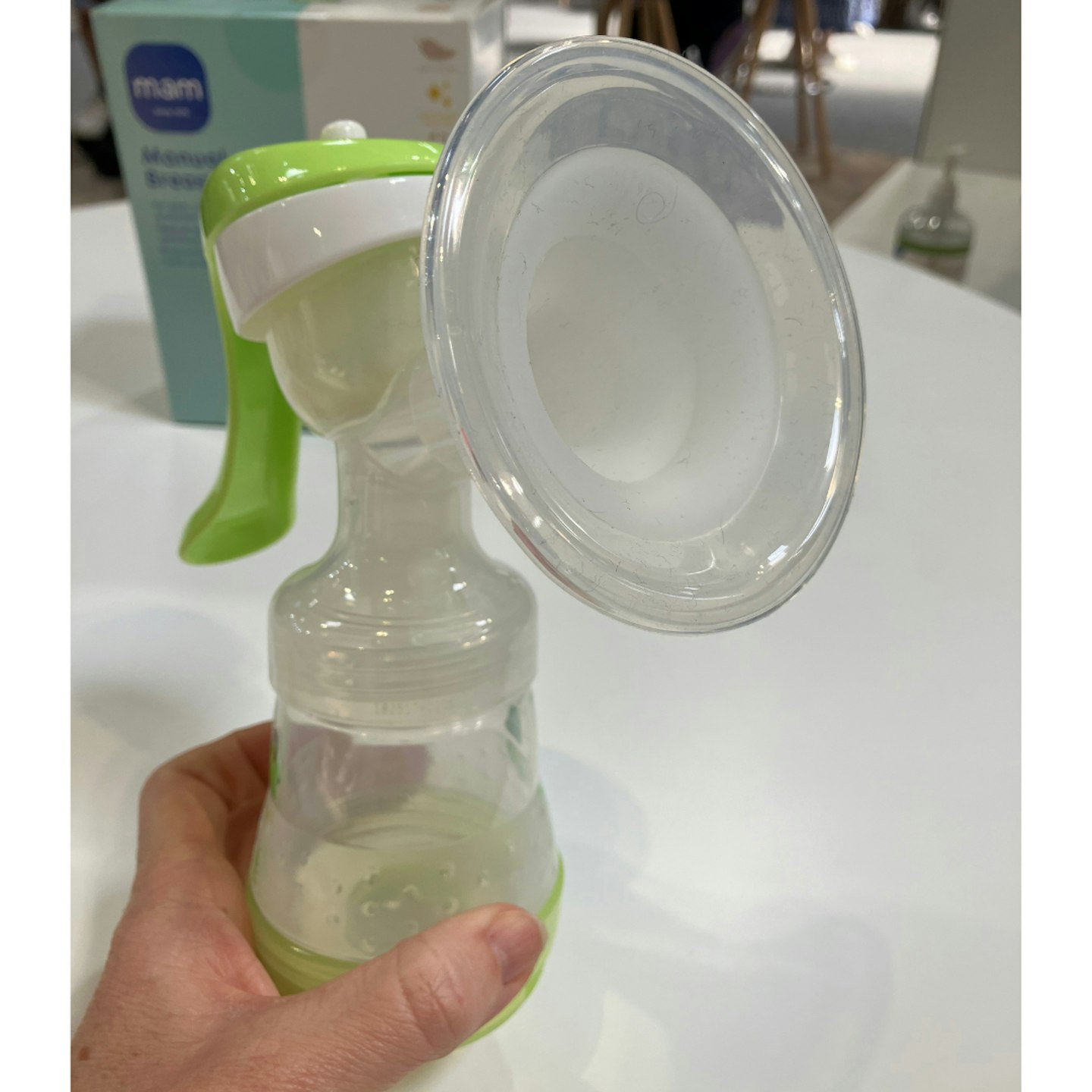 MOTHER&BABY
MOTHER&BABY
If you’re on a budget but still want a reliable breast pump to make expressing a breeze, the MAM Manual Breast Pump might be just what you’re looking for. Loved by mums for its simplicity and ease of use, this manuel pump continues to be a popular choice. “This product made my life so much easier when I had my newborn. I found it so easy to set up and use the manual pump,” said our mum tester Danella.
Its adjustable angle funnel and suction controller allow for personalised comfort and efficient milk expression. Mum Carla said, “I would recommend this product as it is comfortable on the breast. The MAM pump has a lovely design. The funnel is very soft and doesn't cause any marks on the skin.” Designed for expressing milk quickly with ease without causing hand cramps, parents also loved how compact and easy to clean and sterilise this pump was. Our mum tester Eleanor said, “This product is so simple to assemble and sterilise, being a MAM product the bottles can self sterilise in the microwave and the remaining parts are lovely and complacent so can be put in a small Tupperware to sterilise with Milton. The pump itself is very quick to assemble without lots of fiddly parts which is exactly what you need when you are a sleep-deprived mum.”
Compatible with MAM bottles, this pump is convenient for travel and on-the-go pumping, particularly when you consider how affordable it is. The main thing our parent testers would change is the suction power.
Read the full MAM Manual Breast Pump review
Pros
- Highly adjustable
- Relatively easy to clean
- Good value for money
Cons
- Tricky to operate at first
| Type: | Manual |
| Dimensions: | 9.4 x 16 x 19 cm |
| Weight: | 203g |
| Milk Capacity: | 160ml each |
- Easy to assemble
- No batteries required
- Set includes two extra valves
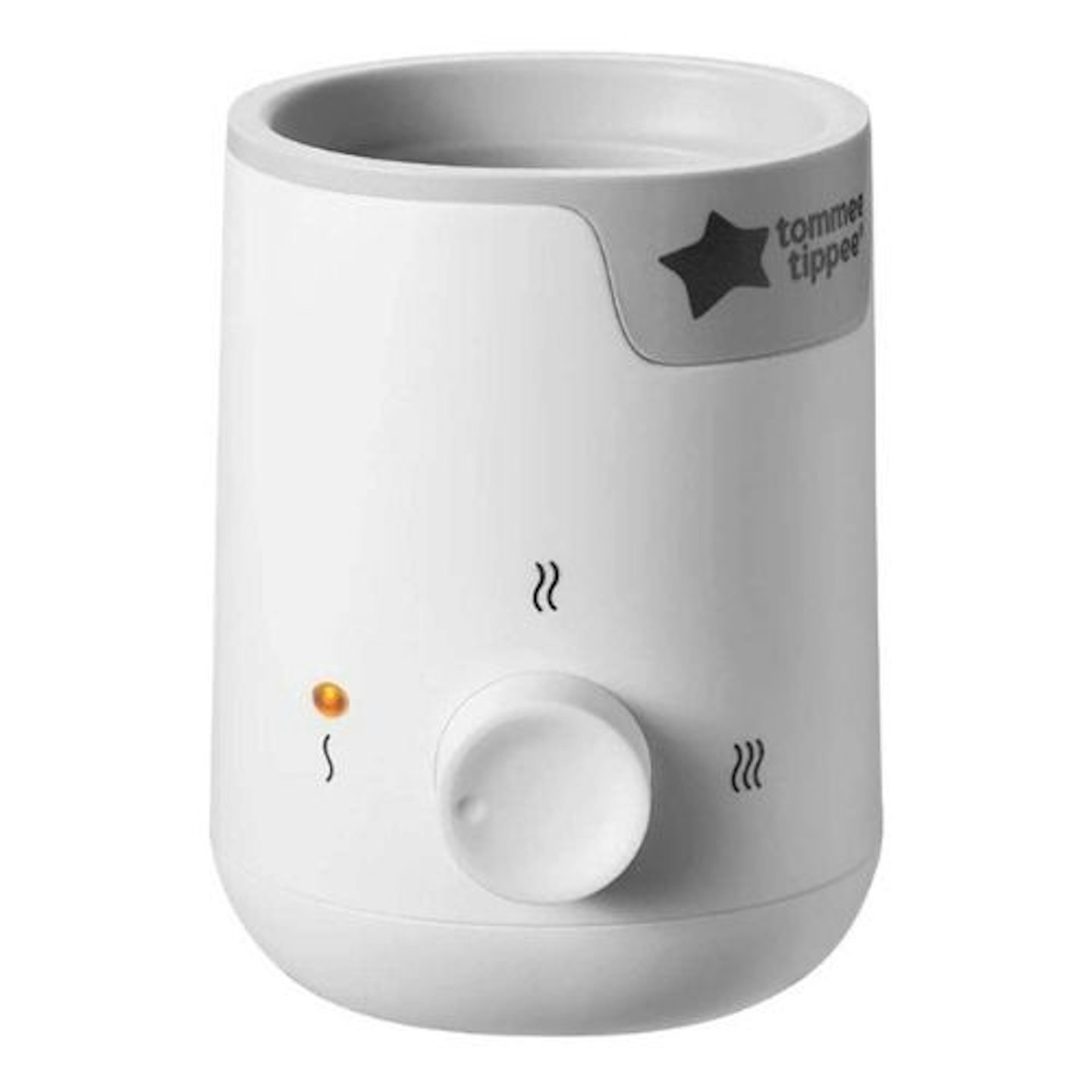
The Tommee Tippee Easiwarm Electric Bottle and Food Pouch Warmer offers a convenient solution for quickly heating breast milk, formula, or baby food. With a warming time of as little as four minutes, it preserves all the nutrients while ensuring a comfortable feeding temperature for your baby.
One mum tester said, “It's incredibly easy to use, heats the bottles quickly, and gives us the peace of mind that the milk is being warmed safely.”
Featuring one-dial operation and three settings, it warms bottles from fridge temperature, room temperature, or maintains warmth with the keep-warm function. Its gentle warming mechanism prevents hot spots for added safety. The intelligent warmer automatically calculates the optimum heating time based on the selected setting and starting temperature of the feed so you don’t have to guess. It also comes with a setting to keep the bottle warm for up to 30 minutes after heating.
Pros
- Automatic timer
- Suitable for most bottle sizes
Cons
- Some people found it noisy
| Warming time: | 4 minutes |
| Temperature settings: | 2 |
Cluster feeding and fussiness often go hand in hand but if you're unsure whether or not your fussy baby is cluster feeding, try other ways to soothe them as well as feeding such as swaddling, rocking or even using some white noise.
Newborn cluster feeding
Many breastfeeding mums experience their newborn baby's cluster feeding right when they're just a few days or even weeks old. It can be hard to know straight away whether your baby is cluster feeding when they are this young because they are yet to establish a routine for you to compare this to.
Do formula-fed babies cluster feed?
Yep! Just like with breastfed babies, if your little one is bottle-feeding with baby formulaor breast milk, they may still cluster feed when experiencing a growth spurt. Formula-fed babies do tend to feed less generally simply because breast milk digests quicker than formula.
Midwife Pip says it's important to be mindful of overfeeding when it comes to formula feeding. "You cannot overfeed a breastfed baby but overfeeding with formula can happen, following your baby's lead and practicing responsive bottle feeding helps to prevent overfeeding."
How to stop cluster feeding
"As challenging as it may feel you don’t actually want to stop cluster feeding," says Midwife Pip. "It is your body and baby's clever way of making sure your milk meets the precise needs of your baby so you don’t want to interfere with or interrupt this biological and normal process," Pip continues.
About the expert
Midwife Pip is a truly passionate midwife and advocate for the profession, bursting with knowledge. Pip is an experienced, practicing Midwifery Sister, MSc graduate, founder of Midwife Pip Podcast, Hypnobirthing and Antenatal Educator, co-author of published research and very importantly, a mum.
Sioned Hilton has over 25 years’ experience working with mums across the UK, she has worked as a registered general and paediatric nurse, including specialist neonatal nursing, has a BSc in Specialist Community Public Health Nursing and accreditation as a registered International Certified Lactation Consultant.
Lorna White is the Senior Digital Writer for Mother&Baby. After running the Yours magazine website, specialising in content about caring for kids and grandchildren, Lorna brought her expertise to Mother&Baby in 2020. She has a keen interest in a range of topics from potty training and nutrition to baby names and early development and has a wide range of experienced medical experts and professionals at her fingertips. In her spare time, she enjoys spending time with her two young sisters, dog walking and enjoying the outdoors with her family.

